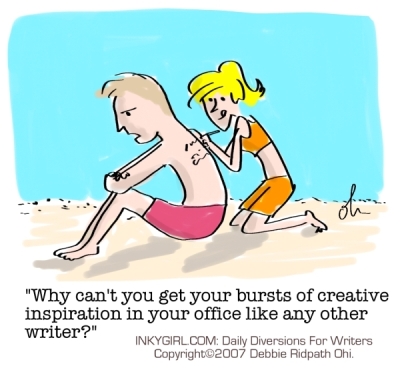
This week I’m bringing you news of a great new short story writing challenge from StoryADay member, Simon Kewin.
Next year Simon and his friends Milo James Fowler and Stephen V. Ramey have pledged to Write1Sub1 – that’s Write One Story and Submit One Story every week of the year (actually, Simon’s taking Christmas off, but still…). You can submit to magazines, websites, or short story contests – anywhere that takes writing seriously.
And they’re not keeping this challenge to themselves: they’re inviting everyone to kick their writing career up a notch by joining in. At the end of this year of intensive writing, you certainly should have figured out how to write a short story, don’t you think?

Here’s an interview with Simon to tell you more. Links to more short story writer’s information are at the end.
What were your inspiration and your personal motivation for this challenge?
Ray Bradbury was our original inspiration. He is supposed to have completed and submitted a short story every week for a year while establishing himself.
The idea for Write1Sub1 materialised during a comment discussion on Milo’s blog and it took off from there. The point is obviously to help our own writing : to provide a focus and an incentive, a sense of community. We’re all keen short story writers and this seemed like a great way to motivate us to write more.
What are the ‘rules’?
The idea is to write a story and submit a story every week for 2011. It doesn’t have to be the same story as obviously it can take more than a week to polish a piece! Those taking part can define “story” as they like : it could be as short as a flash or nano piece for example. It could even be a poem. Whatever works for you.
Some people like the idea but have decided to Write1Sub1 on a monthly rather than a weekly basis, which is fine. Hopefully the challenge will still be a help to them.
How do people join in?
There’s the Write1Sub1 blog to follow and there’s also a Linky there to “sign up”. We plan to do a weekly check in post on a Sunday for everyone to share their experiences of the week. We’ll do a monthly one too for those doing it that way. There is also a Twitter hashtag people can follow – #Write1Sub1 – and there are banners on the blog folks can download.
Where will you submit?
Good question! The people who’ve signed up write a wide variety of different things, so I suppose we’ll all have our own target markets. But we’re putting together a page of useful resources on the blog for tracking down markets, and obviously, sharing our experiences on the blog should be a great help.
How will you stay motivated (esp when the inevitable rejections come in) ?
Hopefully being part of the Write1Sub1 community will be a big help here. It’s definitely a help to know others are going through the same experiences! And of course, the thought of receiving the end-of-year “winner” banner will be a huge incentive!
Thanks, Simon!
There are so many articles in the world already about ‘how to write a short story’, but I’m a firm member of the ‘learn to write by writing’ school or thought. (And reading, of course!). This is one project I’m not going to be able to resist, although I’ll be signing up for the monthly version (there are banners for that too, at theWrite1Sub1 site).
It should ensure that I don’t get lazy and forget how to write a short story between now and May, when StoryADay starts up again!
Useful Links and Writers’ Markets
Write1Sub1 Rules
About the guys behind Write1Sub1
Market Listings from Write1Sub1
2010 Novel & Short Story Writer’s Market from Writer’s Digest (aff)
from Writer’s Digest (aff)
Writer’s Market listings from Writer’s Digest (subscription required. Free email newsletter)
Writers Weekly Market Listings (mostly non-fiction, but occasional fiction listings)





